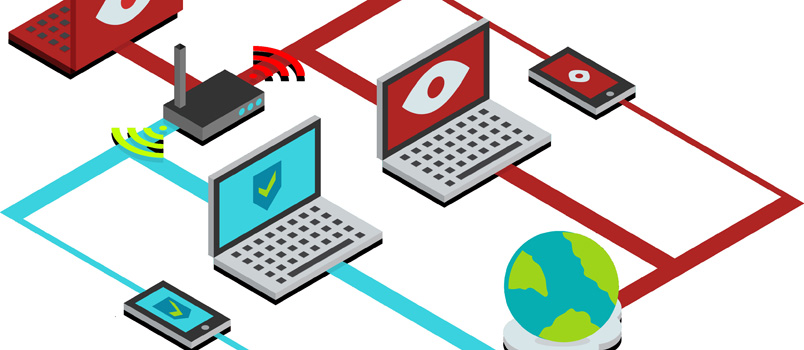The use of virtual private networks (VPNs) and proxy servers is a form of privacy protection when accessing content on the Internet. Both services do the same job – they provide a connection between a computer and a remote server, while maintaining the anonymity of their users. However, each of them uses its own method of disguise.
Virtual Private Network
Virtual Private Network is a secure private channel between devices on the Internet. When a user’s computer, smartphone, or tablet connects to a VPN, all traffic is redirected through a secure tunnel that does not allow anyone, even the Internet provider, to view transmitted messages, credit information, or other actions while browsing the web. Thus, when connected to the Internet using a virtual private network, all Internet traffic is sent through an encrypted remote server.
How does a virtual private network work?
When using this service, data is pre-encrypted. After that, they are transferred to the provider, and then to the VPN server, which connects to the network on behalf of the user. As a result, the destination site identifies the VPN server as the source of traffic. This does not allow the provider to track Internet activity, as well as collect data about users. The only information visible to them is the fact of connecting to the VPN server — nothing else.
You can connect a Virtual Private Network using the browser-integrated extension or using software. Using the application is a guarantee of higher security and privacy. However, be aware that some VPN providers store information about IP addresses, DNS queries, and other information. In order to keep the activity on the Internet really closed, you need to choose a reliable service that does not register usage data.
General characteristics of virtual private networks
– Encryption network traffic.
– The ability to visit sites with limited access by geographic region.
– Privacy protection by changing the IP address.
– Availability of multiple VPN providers.
– Secure use of public Wi-Fi.
– Easy to set up.
– More expensive than proxy servers.
Proxy servers
Proxy is an intermediate that is located between the user’s device and the remote server to which the request is made. Usually, proxies can hide the client’s IP address and use an anonymous network identifier to connect to the network. They do not encrypt data transmitted over the Internet. Since this provides little security, anyone can access traffic that goes through the connection.
The most common types of proxies available:
HTTP and HTTPS proxies are designed for browsing http: // or https: //. They are useful for surfing the web, downloading files, accessing blocked sites and must be configured separately for each browser.
SOCKS Proxy Servers are much more versatile. They support the HTTP, HTTPS, FTP protocols, but they usually work slower since they are more popular and often have a higher load.
Proxy benefits
– Hide the valid IP address of the user.
– Provide an extra layer of protection against malicious websites by filtering network data.
– Allow access to geographically limited content.
– Helps to successfully circumvent web restrictions.
– Reduce website load times.
– Ensure confidentiality during daily web browsing.
Disadvantages of proxy servers
– Most proxies do not have encryption features, so data can be intercepted.
– The owner of the server can see the IP-addresses of users, as well as keep track of their confidential information.
– A connection offered by a public proxy is often unstable (makes streaming difficult).
– Proxy servers can be blocked by certain websites.
– Many free servers are unreliable.
Conclusion
Both the virtual private network and the proxy server allow the user to access the desired destination on the Internet, hiding the valid IP address and their location. However, the common features of the two services end there.
The main difference is the use of encryption technology by a virtual private network, which allows you to send all traffic over a secure connection to a VPN server.
Proxy servers, of course, have their advantages: for periodic use, they are a simple but effective tool. However, VPN services are more reliable as it provides encryption, authentication and integrity protection of the traffic that passes through a secure tunnel. This makes VPN the ideal solution to complex tasks in which security and privacy are paramount.


